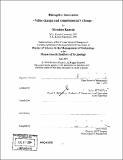Disruptive innovation : value change and complementary change
Author(s)
Kameda, Mitsuhiro, 1971-
DownloadFull printable version (3.862Mb)
Other Contributors
Massachusetts Institute of Technology. Management of Technology Program.
Advisor
James M. Utterback.
Terms of use
Metadata
Show full item recordAbstract
I expand Christensen's concept and classify two disruptive technologies, company disruptive technology and product disruptive technology. The company disruptive technology is Christensen's definition itself. The product disruptive technology is the disruptive one outside his definition, for example the digital still camera (DSC). I will discuss about some cases, such as a case of high-end disruption, in this expanded definition. Company disruption follows product disruption. Targeting "company" is useful for making strategies, but it is not enough to target only "company" disruptive innovation because the product disruption sometimes badly damages or kills companies. Complementors, such as other products, law, environment etc, are also very important when we consider the disruptive technology, because they change the value criteria of the product performance. It is very important for us to take advantage of complementors in order to grow the disruptive technology. Disruption is a process and it does not always disrupt everything. The disruption is limited in the case of value-change disruption and another disruption is usually required to disrupt a product which falls outside the immediate influence of the first disruption. The disruptions must be happen one after another to disrupt all in the case of the value-change disruption. Circumstances also limit the impact of product disruption. Therefore, it is very useful for one to check and consider a disruptive technology from the viewpoints of both the value criteria and the circumstances.
Description
Thesis (S.M.M.O.T.)--Massachusetts Institute of Technology, Sloan School of Management, Management of Technology Program, 2004. Includes bibliographical references (leaves 89-93).
Date issued
2004Department
Management of Technology Program.; Sloan School of ManagementPublisher
Massachusetts Institute of Technology
Keywords
Management of Technology Program.